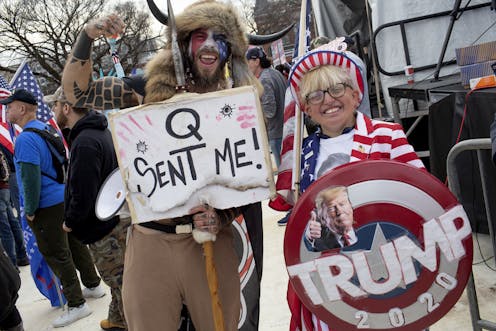Did Biden really steal the election? Students learn how to debunk conspiracy theories in this course
- Written by David Cason, Associate Professor in Honors, University of North Dakota

What’s the real truth about the moon landing? Who really killed JFK?[8] These are just some of the questions we explore in this course. My goal is to balance the serious with the absurd.
I want students to identify the root causes of the conspiracy, use vetted sources and learn to be good consumers of online information.
I also want to train students in the practice of critical analysis. The American Psychological Association has shown that people who practice conspiratorial thinking are more likely[9] to seek simple solutions to complex problems and experience feelings of fear and isolation.
We begin the course examining what we can learn from both political science and psychology. We look at the long history of hoaxes, frauds and deliberate conspiracies in American history, stretching back to the Illuminati, anti-Catholicism[10] and antisemitism[11].
What is old is new again. The idea that a mysterious group like the Illuminati[12] is secretly in control of the world has not gone away. False beliefs about various groups such as Catholics and Jews are, sadly, recycled again and again.
The course also covers the current conspiracy theories about Taylor Swift[13]. This includes the false belief that the outcome of the February 2024 Super Bowl was predetermined so that the Kansas City Chiefs would win, and Swift, the girlfriend of Chiefs tight end Travis Kelce, would announce her support for President Joe Biden.
My course also explores much more serious threats, like QAnon – a dangerous movement that falsely believes secret government operatives are running child sex rings.
We also take a look at topics like UFOs, aliens, Bigfoot and the Loch Ness monster[14].
Why is this course relevant now?
In the current age of political polarization[15], it is critical that I do all I can to equip future leaders and citizens with the tools they need to suss out fact from distraction and outright fiction.
What’s a critical lesson from the course?
My hope is that my students leave the course with the confidence that they need to not only recognize but to openly combat disinformation. We live in an age of oversaturation of information. My students are digital natives. They rarely receive information from traditional media outlets like newspapers. When one considers the wealth of disinformation on the internet, or the prospect that TikTok is their primary source of news,[16] it is critical that students are educated about how to evaluate information.
What materials does the course feature?
I use a number of resources[17] in this class, including magazine articles[18], academic papers, books and websites[19] that give people tools to recognize false information.
Our reading list includes the books “A Culture of Conspiracy:[20] Apocalyptic Visions in Contemporary America,” “Enemies Within: The Culture of Conspiracy in Modern America[21]” and “The Paranoid Style in American Politics and other essays”[22].
What will the course prepare students to do?
My students will feel some discomfort at times confronting their own biases and preconceived notions.
The idea is that my course will prepare students to question and then determine the veracity of patently false information. My students will also be prepared to recognize that most conspiracies are born from conditions of stress and the fear of the other.
References
- ^ Uncommon Courses (theconversation.com)
- ^ election fraud in 2020 (apnews.com)
- ^ U.S. Capitol on Jan. 6, 2021 (www.washingtonpost.com)
- ^ evidence to the contrary (www.pbs.org)
- ^ the “paranoid style” in politics (harpers.org)
- ^ John Birch Society (www.newyorker.com)
- ^ Smith Collection/Gado/Getty Images (www.gettyimages.com)
- ^ really killed JFK? (time.com)
- ^ practice conspiratorial thinking are more likely (doi.org)
- ^ anti-Catholicism (www.splcenter.org)
- ^ and antisemitism (www.adl.org)
- ^ like the Illuminati (theweek.com)
- ^ conspiracy theories about Taylor Swift (www.npr.org)
- ^ Loch Ness monster (theconversation.com)
- ^ political polarization (theconversation.com)
- ^ that TikTok is their primary source of news, (www.pewresearch.org)
- ^ number of resources (adfontesmedia.com)
- ^ magazine articles (www.smithsonianmag.com)
- ^ and websites (www.callingbullshit.org)
- ^ A Culture of Conspiracy: (www.ucpress.edu)
- ^ Enemies Within: The Culture of Conspiracy in Modern America (academic.oup.com)
- ^ The Paranoid Style in American Politics and other essays” (www.burnsiderarebooks.com)
Authors: David Cason, Associate Professor in Honors, University of North Dakota

